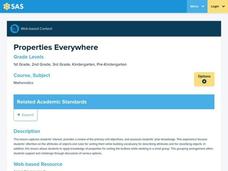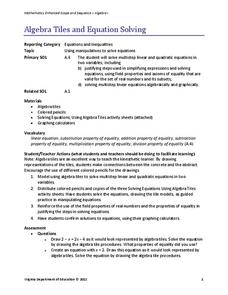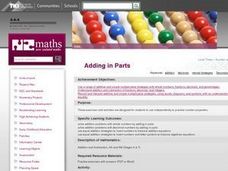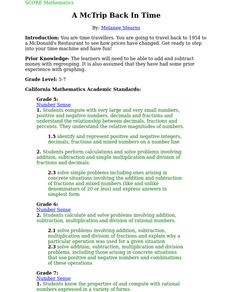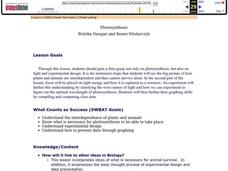Curated OER
Number in Geometry
Students use a number line to assist with their additions. They use a calculator to check for factors. Students are taught factors and multiples. They use array model of multiplication to define meaning. Students develop a wide range of...
Pennsylvania Department of Education
Properties Everywhere
Students examine and sort objects by specific attributes and apply prior knowledge. In this properties everywhere instructional activity, students work in groups to arrange objects in categories then discuss various sorting options while...
Virginia Department of Education
Algebra Tiles and Solving Equations
Young mathematicians solve linear equations by drawing models of algebra tiles using colored pencils. To finish, they solve the same equations algebraically and check their answers using a graphing calculator.
Think Map
Know Your Polygons!
Shape shifters recognize characteristics of polygons. Embracing language arts skills in addition to math, they use a thesaurus to pinpoint specific attributes of a set of polygons. They also participate in a 21-question guessing game...
Alabama Learning Exchange
Watch That Plant Grow
Middle schoolers examine the growth of marigolds in a greenhouse environment. They chart data in spreadsheets showing plant growth over time and under a number of conditions. They record measures of plant height and greenhouse temperature.
Curated OER
Applications of Triangles
Students apply the properties of a right triangle. In this triangle lesson, students describe and compare radians to degrees. They solve problems using the properties and ratios of a right triangle.
Curated OER
Partial Quotients
Fifth graders examine the partial-quotients algorithm for finding the answer to a division problem. In this partial quotients lesson, 5th graders demonstrate the process of division through a series of estimations....
Curated OER
Principles Of Flight: Wings That Spin
Students discover how flight is possible. In this physics lesson, students investigate the properties of a blimp and gyro-copter, comparing rotating wings and fixed wings of aircraft. Students create their own model aircraft...
Pennsylvania Department of Education
A Geometric Scavenger Hunt
Fifth graders connect their knowledge of polygons and polyhedrons. In this geometric shapes lesson, 5th graders identify and classify two- and three-dimensional objects. Students construct a polyhedron out of polygons and describe their...
Curated OER
Comparing Linear and Exponential Functions
Teach your class how to differentiate between linear and exponential functions. They use exponential properties to solve problems, graph them using the TI-Navigator, and make comparisons.
Curated OER
It's About Time!
Students read a short tutorial and complete one or more online activities. They visit an online math dictionary to learn the value of a day, month, week, and year. In addition, they construct word problems based on a favorite month;...
Curated OER
Surface Area of Prisms
Students compute surface area and volume of prisms. In this surface area instructional activity, students find the surface area and volume of rectangular and triangular prisms. Independently, students use their computers to determine...
Curated OER
Mighty Oaks from Little Acorns
What does it mean to grow? To germinate? For the plan detailed here, class members investigate the growth process of an oak tree while focusing on the beginning stages of planting and germination. They plant seeds and record observations...
Curated OER
Food Pyramid Power: Looking Back and Moving Forward
Students show their knowledge of properties of objects as it pertains to sorting and creating patterns. In this food pyramid power activity, students show their ability to use whole numbers in different representations by appling...
Curated OER
Adding in Parts
Third graders are able to split whole numbers into parts. They make numbers up to a tidy number. Students add and subtract tenths to make a decimals number into a whole number. They are able to add whole numbers up to three digits.
Curated OER
A McTrip Back In Time
Students pretend they are time-travellers and travel back to 1954 to a McDonald's Restaurant to see how prices have changed. They need to add and subtract money with regrouping.
Curated OER
The Human Calculator
Students amaze their friends and families with this human calculator trick. In this algebraic lesson plan, students use the associative property of addition to act as a human calculator and stump their volunteers. The steps to the trick,...
Curated OER
1st Grade Problem Solvers
First graders investigate, represent and solve problems using number facts, operations, and their properties. They solve on-step addition and subtraction number sentences and word problems using concrete materials. Students construct...
Curated OER
Nothing To It!
First graders explore the zero property of addition and subtraction through the creation of a class book. Includes an assessment sheet.
Alabama Learning Exchange
Number Clues
Students practice problem solving. In this number identification lesson plan, students practice identifying numbers based on clues or characteristics given. They also work in groups to identify the clues for given numbers.
Curated OER
Patterns, Functions & Algebra
Students participate in numerous activities and games. In pairs, they play card games to find relationships between a random set of playing cards. After writing samples of Dear Abby letters concerning math problems, students create a...
Curated OER
Balancing
Students use a balance to complete subtraction problems and weigh out the items they take away. In this subtraction lesson plan, students use a pan balance and record their equations.
Curated OER
Photosynthesis
Students recognize the importance of plants as they perform an experiment involving photosynthesis. Students determine the optimum wavelength of light for photosynthesis by exposing plants to different colors of light, collecting data,...
Curated OER
Wildflower Beautification Project
Students, in cooperative groups, design and create a wildflower garden for the community. They write letters to property owners requesting use of their land and then write invitations to their parents and to local, state, and federal...



